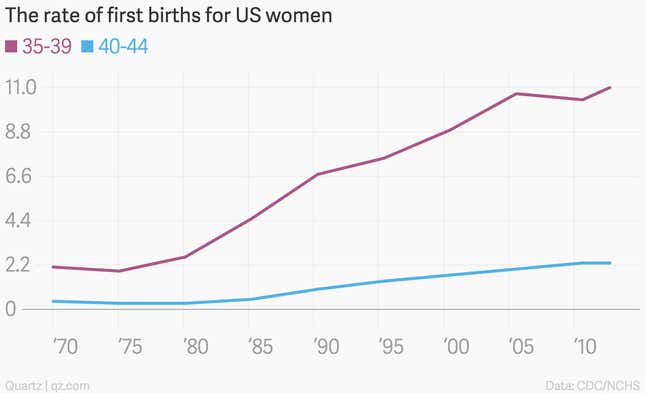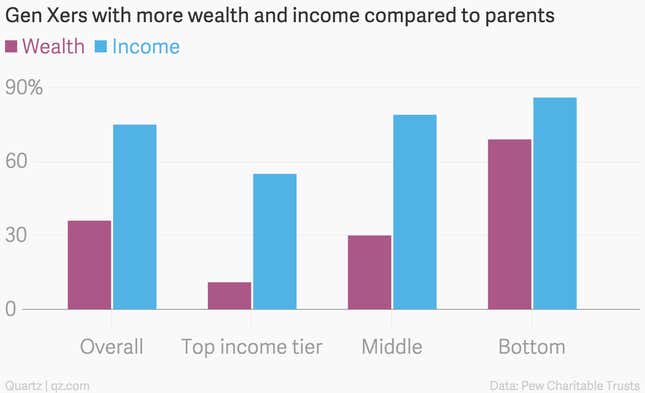As birth rates in the US continue to fall, an educated older parent-driven ‘‘baby boom’’ is underway.
According to the National Center for Health Statistics, the number of first-time moms aged 35 and older is nine times higher than in the 1970s.

American men are also becoming fathers at an older age, particularly if they have a bachelor’s degree or more. US Census figures show a steady increase over the past 15 years in the proportion of 40- to 49-year-old married dads to kids under the age of six.
But contrary to a vociferous faction of the 40-plus “happymommy” blogger crowd and out-of-touch child-raising manuals, it’s not going well at all.
Katrina Alcorn, author of the bestselling Maxed out: American Moms on the brink, says women who delayed having kids ‘‘to try to get a foothold in their careers or to get some financial stability’’ are being pushed beyond their limits as they struggle with work-life balance and the additional burdens that mid-life brings.
‘‘They find themselves in their 40s, sandwiched between raising young kids and trying to take care of aging parents while also trying to support their families financially,’’ she explains to Quartz.‘‘It’s too much.’’
One Washington, DC-area working mom in her 40s (who asked not to be named) tells Quartz: ‘‘I feel like I am a parent to four small children not two, and I’m not sure cloning myself would even be enough.” She’s also caring for her sick mom and dad (who live in another state) and juggling an array of end-of-year parties, concerts and “graduations” for her preschoolers. At the same time, she is holding down a full-time job, like her husband, except hers demands regular travel.
The men in these high-powered couples are wilting under the pressure too.
Rush hour of life
Alpha dads have to navigate what Dutch Economist Lans Bovenberg calls ‘‘the rush-hour of life,’’ typically in one’s late 30s or early 40s, when child-raising and professional responsibilities peak. Unfortunately, economic and social structures that have traditionally supported parents are disappearing.
One review of the academic literature shows ‘‘common sources of support for older parents like family, friends, neighbors and community,’’ have been found to exist ‘‘minimally, if at all.’’
It doesn’t necessarily ease the burden if parents managed to pop out one or two kids by their late 30s because they still have little ones of preschool age and younger in their 40s. Studies show parents are at their most exhausted when they have children under seven.
Little wonder, then, that researchers have found the statistical life-cycle peak for unhappiness around the age of 40 to 42.
Middle-class crunch
On top of all this angst, the 40-plus, dual-career couple with ankle-biters is enduring the biggest parenthood penalty in living memory.
Childcare fees have jumped astronomically, up 37% in 12 years in the US for a married couple with two kids.
But wages, job security, and benefits for working parents have not kept pace.
The income of a married couple with two children remained almost frozen for the 12 years prior to 2012 at just above $84,000 but the annual ‘‘costs of key elements of middle-class security—child care, higher education, health care, housing, and retirement—rose by more than $10,000’’ says the Center for American Progress.
Hit by the crisis
If things weren’t already bad, the late-starter parent crowd got whacked by the financial crisis. Americans born between 1965 and 1980, were almost knocked out when the global economy teetered after 2007.
A disturbing study of their financial vulnerability reveals that ‘‘Gen Xers were hit particularly hard by the Great Recession, which brought falling housing values and rising unemployment rates. As a result, they lost nearly half their wealth between 2007 and 2010.’’
According to Pew Charitable Trusts research, almost 50% of of their wealth, in the form of bank accounts and retirement savings, real estate, businesses, and vehicles, just vanished.

‘‘Three quarters of Gen Xers have higher incomes than their parents but just a little over a third have more wealth,’’ Diana Elliott co-author of the report “A New Financial Reality: The balance sheets and economic mobility of Generation X,” tells Quartz.
‘‘And one of the big reasons why they’re falling short is that they have a lot more debt than their parents had—for example six times more debt than their moms and dads had at the same age—which is a really big difference.’’
In her research, Elliott looked at upwardly-mobile college graduates to try to understand the wealth disparity. Elliot found that 38% of those who graduated college have student debt as a hold-over, and half have credit card debt.
Structural reforms that could lighten the load have stalled.
‘‘The US is uniquely hostile to the needs of working parents,’’ says Maxed Out author Katherine Alcorn. ‘‘Our government policies lag far behind those of most other developed nations (for example, we’re the only country in the developed world that lacks paid maternity leave and half of American workers lack paid sick days) and we also work longer hours and have less paid time off than people in other developed countries. This creates a perfect storm for working parents.”
Was postponing kids really worth it?
Gen X professionals left it perilously late to procreate, and are now juggling all manner of difficulties all at once: financial, career, personal and relationship, mental and physical.
It’s not entirely our fault. We delayed major milestones because of study, work, travel, recessions, financial concerns, and a changing marriage market.
Now, late-bloomer parents are foregoing retirement savings, college savings for their kids, or any savings just to be able to come up with the cash to pay creches, babysitters and nannies.
Pew’s Elliott is co-authoring a forthcoming paper looking at how debt levels are affecting my generation’s capacity to set money aside.
‘‘With nearly four in 10 of these upwardly-mobile Gen Xers still paying college debt it presents this interesting scenario: are they in fact saving or how are they saving for their kids to go to college?’’ she asks.
So let’s stop with the saccharine, in-denial paeans to the joys of older parenthood. Just because Hollywood celebrities are allegedly giving birth “naturally” in their 40s and looking radiant doesn’t mean the journey of belated mother- and fatherhood for the rest of us is so seemingly effortless.
BBC newsreader Kate Silverton, who gave birth to her second child at 43, bravely acknowledged the reality: ‘‘My generation left parenthood till 40. I am not sure we got it right.’’
We are living the new demographic paradigm, but we are certainly not living the dream.
